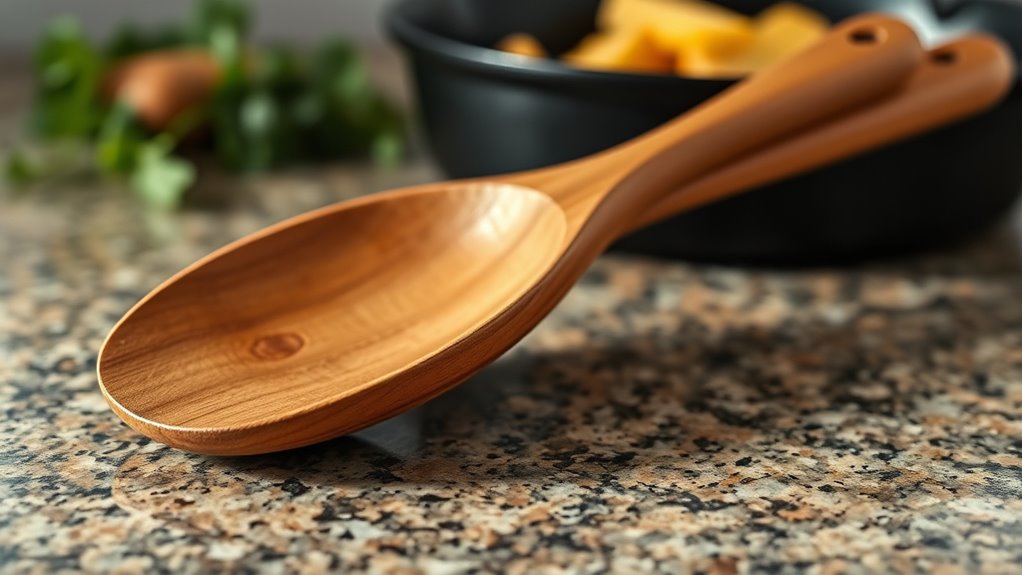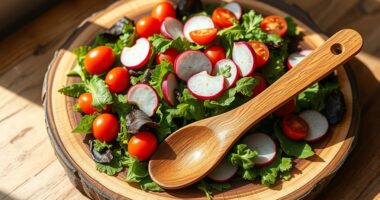Using wooden utensils can truly enhance your cooking experience. They protect your cookware from scratches, resist heat, and are gentle on non-stick or ceramic surfaces. Wooden tools are easy to clean, eco-friendly, and naturally antimicrobial, promoting better hygiene. Plus, their warm tones and handcrafted designs add rustic charm to your kitchen decor. With proper care, they last long and become functional artwork. Discover more ways wooden utensils can elevate your cooking style and kitchen environment.
Key Takeaways
- Wooden utensils protect cookware surfaces, preventing scratches on non-stick and ceramic pots.
- They resist heat, reducing burns and enabling safer, comfortable stirring during high-temperature cooking.
- Their natural antimicrobial properties promote hygiene and reduce bacterial growth in your kitchen tools.
- Handcrafted wooden utensils add rustic charm and aesthetic appeal to your cooking space.
- Proper maintenance, like regular sealing and drying, ensures durability and enhances your overall cooking experience.
The Benefits of Wooden Utensils in Daily Cooking

Wooden utensils are a practical choice for everyday cooking because they protect your cookware and improve safety. Their durability and repairability mean they’ll last for years, even with daily use. Wooden utensils won’t scratch non-stick or ceramic surfaces, helping extend the lifespan of your cookware. They also resist heat, making stirring at high temperatures safer by reducing burns. The natural antibacterial properties of wood help maintain food safety by inhibiting bacterial growth. Additionally, water-resistant properties make wooden utensils easier to clean and maintain over time. Furthermore, versatility in design allows for a variety of cooking tasks, from stirring to serving, enhancing their functionality. Plus, their aesthetic appeal adds a warm, natural touch to your kitchen. Choosing wooden utensils supports sustainability since they’re made from renewable resources. Their heat resistance is especially beneficial when working with hot ingredients, providing added safety during cooking. Modern manufacturing techniques also improve the durability and quality of wooden utensils, ensuring they remain a reliable kitchen tool over the years. Incorporating eco-friendly materials in production further emphasizes their environmentally conscious appeal. With their blend of durability, heat resistance, and natural benefits, wooden utensils elevate your cooking experience while ensuring safety and style in your kitchen.
How Wooden Spoons Improve Food Safety and Hygiene
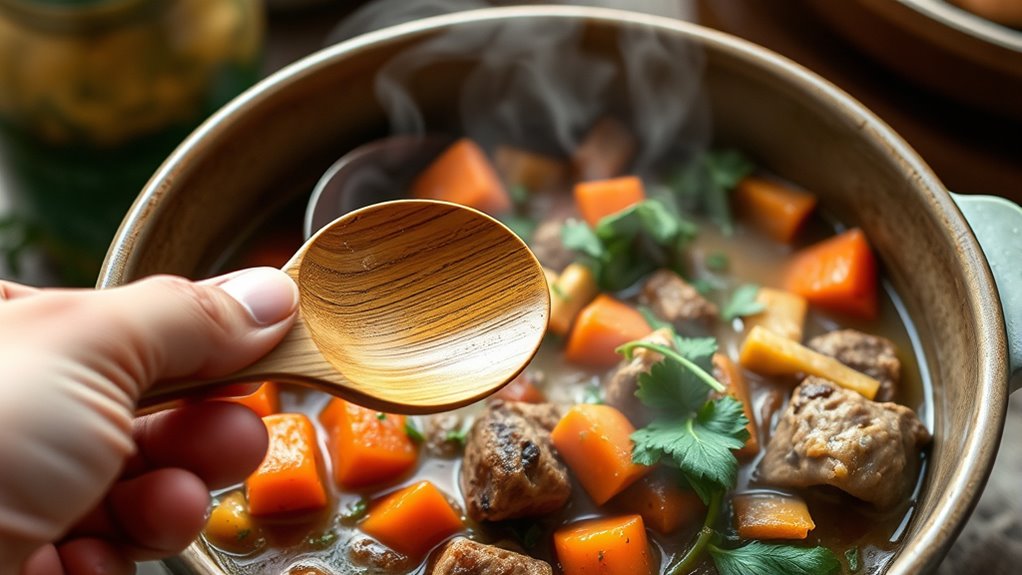
Building on the durability and safety features of wooden utensils, wooden spoons also play an essential role in maintaining food safety and hygiene. They naturally possess antimicrobial properties that inhibit bacterial growth, helping keep your kitchen hygienic. Unlike plastic utensils, wooden spoons are non-reactive, so they won’t leach harmful chemicals into your food. When properly cleaned and dried, they’re less likely to harbor bacteria, reducing the risk of cross-contamination. The porous surface of wooden spoons absorbs moisture, which can discourage bacterial proliferation if maintained correctly. Regular hand washing and occasional oiling enhance their hygienic qualities, making them a safe choice for food preparation. Overall, wooden spoons contribute greatly to a safer, more hygienic cooking environment.
The Aesthetic Appeal of Wooden Utensils and Kitchen Decor
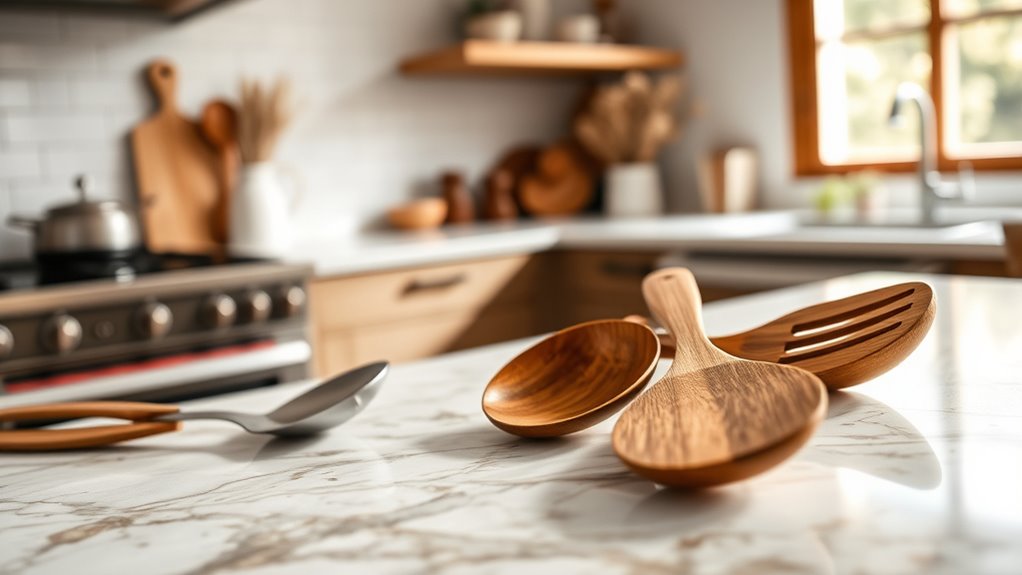
When you incorporate wooden utensils into your kitchen, they do more than just serve a functional purpose—they also enhance your space’s visual appeal. The natural wood’s grain patterns and warm tones add a cozy, rustic charm that complements various kitchen decor styles. Handcrafted wooden spoons and serving pieces often feature intricate carvings and unique finishes, elevating the aesthetic appeal of your culinary space. The rich hues of woods like teak, walnut, and cherry blend seamlessly with both traditional and modern interior styles, creating a harmonious look. Wooden utensils and boards act as both practical tools and decorative accents, helping you craft a cohesive, inviting environment. Their timeless natural wood finish makes your kitchen feel more personalized, warm, and visually pleasing. Additionally, the aesthetic appeal of wooden utensils can be further enhanced by their ability to showcase the natural beauty of the wood grain, which varies uniquely with each piece.
Comparing Wooden Utensils to Metal and Plastic Alternatives
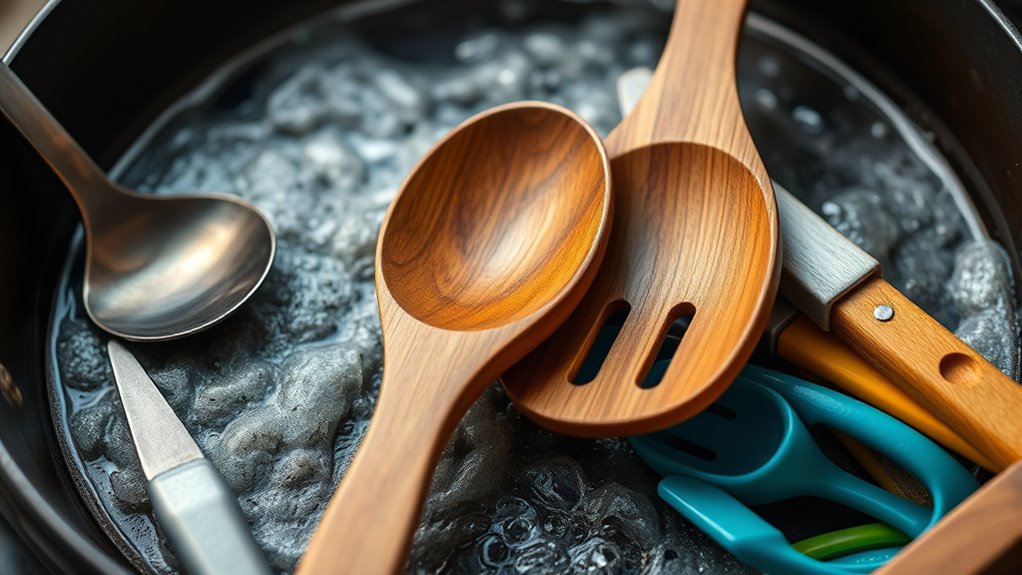
Compared to metal and plastic utensils, wooden tools offer distinct advantages that enhance both cooking and safety. Wooden utensils are non-reactive, so they won’t transfer metallic tastes or chemical residues to your food, unlike metal and plastic options. They’re also scratch-resistant, protecting your cookware’s cooking surface, especially non-stick or ceramic coatings. Unlike metal utensils, wood doesn’t conduct heat, preventing handle burns during use. When compared to plastic, wooden utensils are naturally antimicrobial and less likely to harbor bacteria when properly cared for. Additionally, they’re eco-friendly and biodegradable, reducing environmental impact. Wooden utensils combine safety, durability, and sustainability, making them a smart choice for your kitchen. Proper care ensures they remain functional and beautiful, further enhancing your cooking experience. Regular use can also help prevent bacterial buildup, by maintaining their natural antimicrobial properties, which are especially beneficial in maintaining a hygienic kitchen environment. Incorporating vibrational energy through mindful cleaning and handling can further prolong their lifespan and safety.
Selecting the Right Wooden Utensils for Your Kitchen Needs
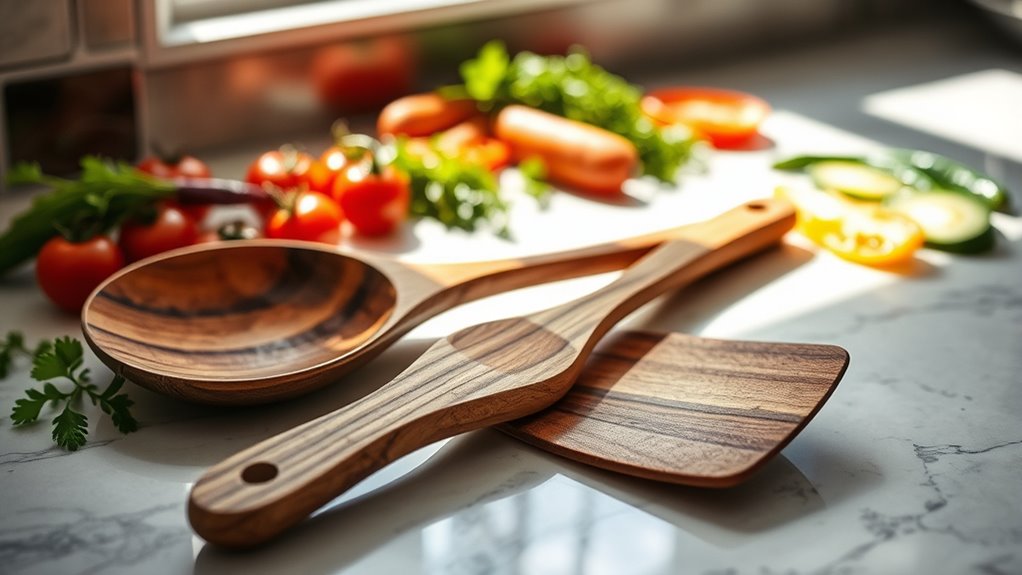
When choosing wooden utensils, consider the durability and care needed to keep them in top shape, like selecting hardwoods such as maple or cherry. Think about the specific tasks you’ll use them for, ensuring the shapes and sizes fit your cooking style. Additionally, selecting utensils with ergonomic design can improve comfort and reduce fatigue during extended use. Finally, pick utensils that match your kitchen’s aesthetic and feel comfortable in your hand for a better cooking experience. Incorporating internal company hackathons can also inspire innovative ideas for designing ergonomic and functional utensils, making your cooking tools even more effective.
Material Durability & Care
Choosing the right wooden utensils for your kitchen depends on selecting durable materials and knowing how to care for them properly. Hardwoods like maple, cherry, acacia, and walnut offer superior durability, resisting water, cracking, and chipping, making your utensils long-lasting. Regular maintenance involves sealing the wood with food-grade mineral oil or beeswax to prevent moisture absorption, which can cause warping or splitting. Hand washing with mild soap and immediate air drying are essential to preserve their integrity and prevent bacterial buildup. When utensils become worn, light sanding followed by resealing with natural oils can restore their appearance and extend usability. Proper storage in a dry, ventilated area also helps prevent mold, ensuring your wooden utensils stay durable and functional for years. Additionally, selecting utensils made from hardwood materials enhances longevity and reduces the need for frequent replacements. To further prolong their life, consider periodically applying natural oil finishes, which nourish the wood and maintain its resistance to moisture.
Suitable Kitchen Tasks
Selecting the right wooden utensils for your kitchen involves understanding that different tools are designed for specific tasks. For example, wooden spoons with narrow, tapered shapes excel at scraping and stirring in small or narrow pots, while wider, rounded spoons are better suited for serving or mixing larger quantities. When choosing utensils, consider the durability and heat resistance of hardwoods like maple, cherry, or acacia, which withstand frequent use and moisture. Using appropriate wooden utensils for each kitchen task helps maintain cookware surfaces, promotes cooking safety, and increases efficiency. Matching the right tool to the task ensures a smoother cooking experience and longer-lasting utensils. Additionally, selecting utensils made from Vetted brands ensures reliability and quality in your kitchen tools. Opting for high-quality, vetted materials can also prevent stains and odors from absorbing into the wood over time. Incorporating utensils crafted from organic, sustainable woods can further enhance your commitment to eco-friendly practices. Being aware of international market influences can help you choose the best materials and tools that align with current trends and standards in kitchenware. Moreover, choosing utensils with proper finish and treatment can extend their lifespan and maintain their appearance through regular use.
Aesthetic & Ergonomic Fit
To guarantee your wooden utensils fit comfortably and look appealing in your kitchen, pay attention to their ergonomic design and aesthetic qualities. Choose utensils with ergonomic shapes, like curved handles and balanced weight, to ensure a comfortable grip and reduce fatigue during extended use. Well-finished wood with smooth surfaces minimizes splinters and enhances tactile comfort. The natural grain patterns and warm tones of handcrafted utensils add visual harmony, elevating your kitchen’s aesthetic. Select tools that match their size and design to specific tasks, such as large spoons for stirring or narrow spatulas for delicate work. Prioritizing handcrafted options often assures a better ergonomic fit and unique style, making your cooking experience more enjoyable and visually pleasing. Additionally, selecting self watering plant pots with aesthetic appeal can complement your culinary space and create a cohesive, inviting environment. Incorporating entertainment options such as themed decor or functional kitchen accessories can further enhance your space’s ambiance and usability. Paying attention to kitchen decor elements like textiles and wall art can add warmth and personality. Using textile line-inspired decorative elements can also add texture and warmth to your kitchen decor, creating a cozy atmosphere. Understanding the importance of ergonomic design can help you choose utensils that reduce strain and improve comfort during prolonged use.
Proper Care and Maintenance to Extend the Life of Wooden Tools
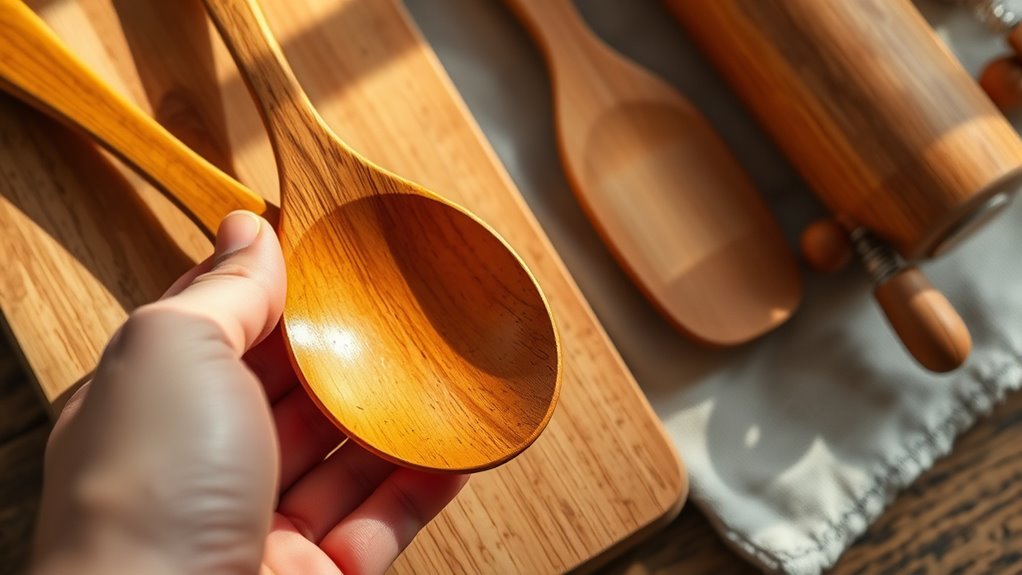
Proper care and maintenance are essential for keeping your wooden utensils in top condition and ensuring they last for years. To extend their lifespan, wash your wooden utensils with mild soap and warm water, avoiding dishwashers, which can cause warping and cracking. Regularly apply food-grade mineral oil or beeswax to keep the wood moisturized, preventing it from drying out. Always allow your utensils to air dry completely before storing to avoid moisture buildup and mold growth. If any rough or splintered areas develop, lightly sand them with fine-grit sandpaper and reseal. Proper storage is also vital; keep your wooden tools in a dry, well-ventilated space, away from direct sunlight and high humidity. These simple care and maintenance steps will keep your utensils in excellent shape for years to come.
The Environmental Advantages of Using Wooden Utensils
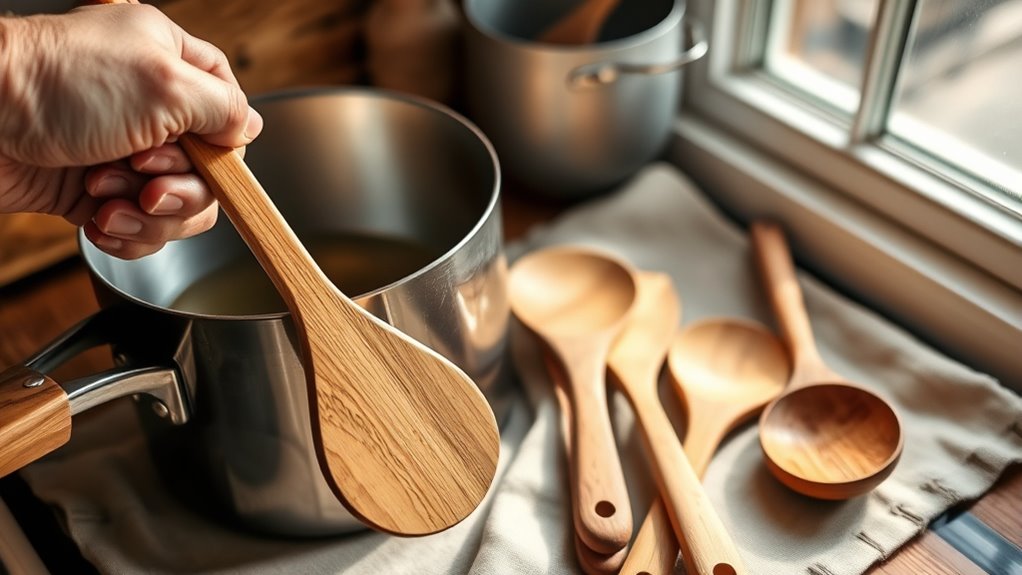
Using wooden utensils offers several key environmental benefits that make them a sustainable choice for your kitchen. Made from renewable resources like sustainably harvested hardwoods, they help reduce the environmental impact compared to plastic or metal tools. Wooden utensils are biodegradable, meaning they can be composted at the end of their life, minimizing waste. They support eco-friendly forestry practices, ensuring resources are replenished responsibly. Additionally, their production requires less energy, lowering their carbon footprint. Properly maintained, wooden utensils last long, decreasing the need for frequent replacements and reducing waste.
- Crafted from sustainable materials and renewable resources
- Biodegradable and compostable at end-of-life
- Support eco-friendly forestry and reduce environmental impact
- Require less energy to produce, lowering their carbon footprint
Incorporating Craftsmanship and Artistry in Wooden Kitchenware
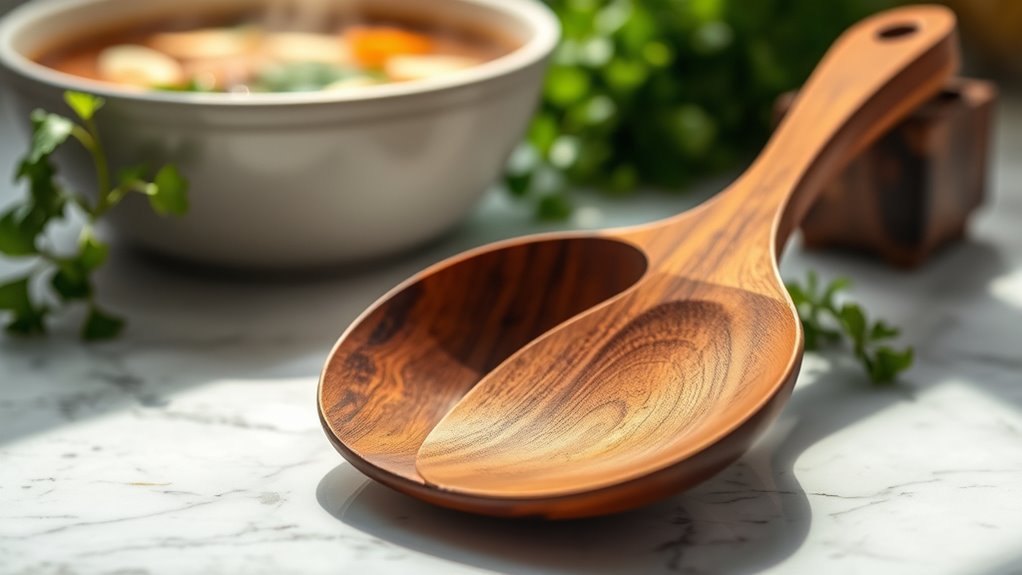
Incorporating craftsmanship and artistry into wooden kitchenware transforms functional utensils into mesmerizing works of art. When you choose handcrafted wooden utensils, you appreciate the detailed craftsmanship and unique carvings that showcase the artisan’s skill. Artisans carefully select sustainable woods like teak, cherry, or walnut, blending environmental responsibility with visual appeal. Finishing techniques, such as natural oil treatments and polished surfaces, enhance both the beauty and durability of artisanal kitchenware. Each piece bears distinctive marks or patterns, reflecting traditional woodworking methods and adding character. By embracing artisanal craftsmanship, you elevate your cooking experience with utensils that are not only functional but also serve as exquisite, artistic elements in your kitchen. This approach turns everyday tools into cherished, handcrafted treasures.
Frequently Asked Questions
Why Are Wooden Cooking Utensils Better?
You’re wondering why wooden cooking utensils are better, and there’s a lot to love. They’re gentle on your cookware, preventing scratches and preserving non-stick surfaces. Since they don’t conduct heat, you won’t burn yourself. Their natural antimicrobial properties keep your food safe, and over time, they develop a non-stick patina, making cleaning easier. Plus, they’re durable, eco-friendly, and made from renewable woods, making them a smart choice for your kitchen.
Why Is It Better to Use a Wooden Handle for a Cooking Utensil?
You might think metal handles are tougher, but wooden handles actually keep you safer and more comfortable. They don’t conduct heat, so you avoid burns, and their natural grip prevents slips. Plus, they stay cool longer, reducing hand fatigue, and are durable enough to last through many meals. Ironically, what seems like a simple choice—wooden handles—actually offers smarter, safer, and more ergonomic benefits for your cooking adventures.
Why Do Wooden Spoons Make Food Taste Better?
You might wonder why wooden spoons make food taste better. Well, they absorb and retain flavors over time, subtly enriching your dishes with each use. Their natural porous surface develops a seasoned patina that adds depth, and they won’t react with acidic or spicy ingredients, keeping flavors pure. Plus, wooden spoons are gentle and won’t impart any metallic or chemical aftertaste, ensuring your food stays delicious and true to its ingredients.
Do Professional Chefs Use Wooden Spoons?
You might wonder if professional chefs use wooden spoons. The answer is yes. They prefer wooden utensils because they’re gentle on cookware, provide a comfortable grip, and help control stirring and mixing. Wooden spoons also resist heat, don’t react with food, and are durable enough for busy kitchens. By using wooden utensils, you can bring a touch of professional quality and tradition to your own cooking.
Conclusion
By choosing wooden utensils, you infuse warmth and character into your kitchen, much like a cozy fireside. They’re safe, stylish, eco-friendly, and easy to care for, making your cooking experience more enjoyable. Embrace the craftsmanship and natural beauty of wooden tools, and you’ll find your kitchen becoming a haven of tradition and style. Switch to wood, and watch your culinary journey become richer and more inviting with every stir and serve.
